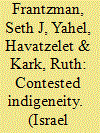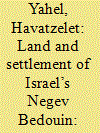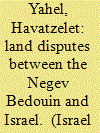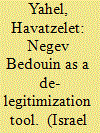|
|
|
Sort Order |
|
|
|
Items / Page
|
|
|
|
|
|
|
| Srl | Item |
| 1 |
ID:
112526


|
|
|
|
|
| Publication |
2012.
|
| Summary/Abstract |
The article examines the history of the development of a discourse that regards the Bedouin of the Negev desert in Southern Israel as an indigenous people of Israel. This movement has generated a great deal of activity in recent years, particularly the submission of a petition to the U.N. by activists asking for the Bedouin to be recognized as having indigenous communal rights in 2005. The subject is examined in the context of the worldwide recognition of indigenous rights that culminated in the U.N. Declaration on the Rights of Indigenous Peoples, which was adopted on the 13th of September 2007. The article takes account of the processes and activities of individuals who have helped lead and craft a narrative of an indigenous Bedouin identity. It also explores the rise of an indigenous consciousness movement as reflected in states, academic institutions, NGOs, and individuals across the world, with a focus on some of the implications for Israel and the region of the current struggle for recognition for indigenous rights.
|
|
|
|
|
|
|
|
|
|
|
|
|
|
|
|
| 2 |
ID:
137039


|
|
|
|
|
| Summary/Abstract |
While much has been written on various aspects of the 1948 War, the story of the Negev Bedouins' role and their relations with the newly formed Jewish state has drawn little attention. This article focuses on a short but important episode in the establishment of Israeli–Bedouin relations by examining the Negev Bedouin involvement in the 1948 War, predominantly on the side of the Arab armies, and the circumstances of their departure. Its findings contradict previous academic narratives and baseless statements regarding Bedouin–Israeli relations, including unfulfilled promises by the Israeli authorities to recognize Bedouin claims to land rights.
|
|
|
|
|
|
|
|
|
|
|
|
|
|
|
|
| 3 |
ID:
161478


|
|
|
|
|
| Summary/Abstract |
This study examines the development of official policy, mainly regarding land and settlement, in the three decades following Israel’s establishment, focusing on ad hoc committees appointed to deal with Bedouin issues. The majority of the committee reports included suggestions for ending disputes between the Bedouin and the State over Negev lands and/or to establish Bedouin permanent settlement. However, few of the proposals were implemented; de facto recommendations were halted before or shortly after implementation began. Based on archival documentation, the study reveals that State policy was ad hoc, inconsistent and constantly changing.
|
|
|
|
|
|
|
|
|
|
|
|
|
|
|
|
| 4 |
ID:
073385


|
|
|
|
|
| Publication |
2006.
|
| Summary/Abstract |
The conflict between the State of Israel and the Negev Bedouin over land is not new; State vs. nomadic land ownership is an on-going dispute originating as early as the Ottoman Empire. Illegal construction and land use are its widespread expressions, making it difficult for the State to supply basic needs to its citizens. Furthermore, the dispute creates obstacles to the development of the Negev for the benefit of all its inhabitants. This article will try to lay out the Government's approach, as the author perceives it, to the resolution of the land dispute, through reaching financial settlements with various Bedouin individuals and tribes. Monetary and land compensation have both been offered, along with the revival of the Land Title Settlement procedure, as part of a new Government policy.
|
|
|
|
|
|
|
|
|
|
|
|
|
|
|
|
| 5 |
ID:
177573


|
|
|
|
|
| Summary/Abstract |
This article explores the evolution of Bedouin international advocacy and discourse within UN human rights bodies, starting with the first in 1998 to present. It demonstrates that during the last two decades, Bedouin international advocacy in UN bodies was carried out by various NGOs with differing agendas. The discourse on Bedouin issues was co-opted by national and foreign NGOs, some of which possessed clear anti-Israeli views. Parallel to the increasing volume of Bedouin international involvement, their issues became an asset in the overall efforts to de-legitimise Israel. The Bedouin’s harsh living conditions and ongoing land conflict with the state assisted in portraying Israel as an apartheid state.
|
|
|
|
|
|
|
|
|
|
|
|
|
|
|
|
| 6 |
ID:
183374


|
|
|
|
|
| Summary/Abstract |
Over less than a century, the majority of the once nomadic Bedouin of southern Israel were moved to live in towns that were established for them by the state, in the process of urbanization. These towns are far from satisfying the desires and needs of all the Bedouin. The rest of the Bedouin prefer to live outside the towns in a rural space. Based on archival sources the study reveals that the early policy supported the establishment of rural agricultural villages and transferring all Bedouin into fellahin (peasants). This policy was only later changed towards urbanization, a change that brought a problematic outcome. At the core of this study is an attempt to trace the reasoning that stood behind these policies and to make an analysis of their development and implementations
|
|
|
|
|
|
|
|
|
|
|
|
|
|
|
|
|
|
|
|
|